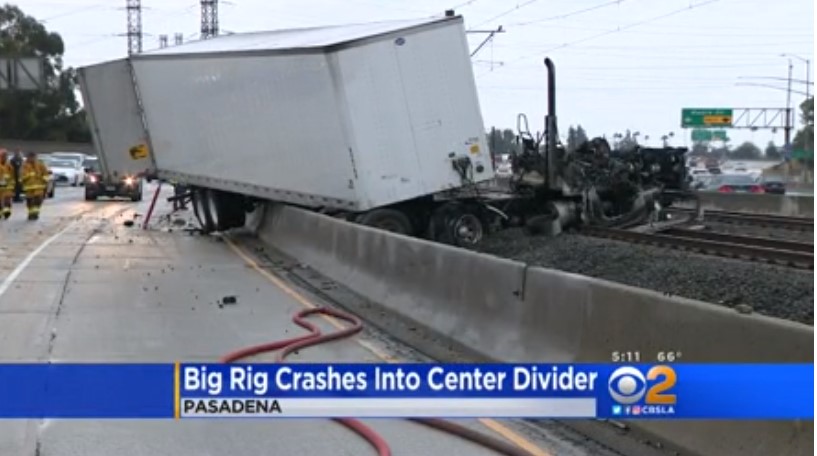On Saturday morning, a truck jumped the median barrier on the 210 Freeway, crashed onto the Gold Line tracks, and caught flame. CBS2 coverage quoted witness who stated that the truck "crossed four lanes of traffic before barreling through the jersey barriers [...] that separate the freeway from the Metro train tracks." This is not the first time a crash on the 210 Freeway has shut down the Gold Line, nor will it be the last - unless Metro and Caltrans can implement delayed safety upgrades.
On Saturday, the driver survived and no one else was harmed. Luckily, there was no Gold Line train on the tracks at that time. Gold Line riders did endure serious delays as train service was blocked completely from 7 a.m. until 12:45 p.m. and single-tracked until after 3 p.m.
Major accident 210 West bound at Allen in Pasadena @ABC7 @KTLAMorningNews pic.twitter.com/T0oNRbcB3P
— Reggie (@BigReg38) October 13, 2018
The crash got plenty of media attention, including coverage at ABC, KTLA, CBS , and the Pasadena Star News. These accounts detail what happened, and offer some information on immediate impacts to drivers and transit riders. All the press accounts fail to note the known safety issues in this area, as evident from a history of similar crashes that regularly occur on this stretch. They also omit Metro's plans to fix the dangerous conditions, and Caltrans' delaying the implementation of Metro's safety upgrades.
The October 13 incident is the third crash to jump this freeway barrier in 2018, after crashes in April and January. Earlier crashes took place in December 2016, March 2016, in 2014 - and that is only a partial list.
In July, Metro project staff first announced that design work was underway on the agency's I-210 Barrier Replacement Project. Metro plans to upgrade the 210 Freeway with new stronger barriers, plus an intrusion detection system. Design costs are anticipated to be $11 million. Even when first announced, Metro staff had already flagged the project for anticipated delays due to constraints imposed by Caltrans.
The situation is the same in Metro's major project status report this week. The barrier upgrade design project has been flagged as a "possible problem" - meaning Metro anticipates the project exceeding its timeline and/or budget. The reason for the delay is that Caltrans has been unable to find "effective mitigation measures" to "alleviate freeway traffic disruption during construction." (What about ongoing Gold Line disruptions due to crashes? Why isn't Caltrans mitigating that?)
There is a small piece of good news this week: Metro has Caltrans' agreement to proceed with a ~1.5 mile stretch (about a quarter of the overall six mile project) which can proceed separately. According to the Metro status report (page 11) "the segment of the project from Michillinda [Avenue] to Iconic [Gold Line] Bridge in both eastbound and westbound directions the barriers could be replaced without closure of HOV lane during construction" so that segment will proceed with "separate environmental documentation." The segment is located immediately east of Pasadena, in the adjacent city of Arcadia.
To date the unsafe conditions on Caltrans freeway have yet to take the life of a Gold Line rider or operator. How will Caltrans respond when a truck crashes into a crowded train? What will the courts decide? What will the court of public opinion decide?
It is astonishing that Caltrans continues to drag its heels on this clearly needed safety upgrade.
Is it really worth the risk to the lives and limbs of transit riders to delay construction while Caltrans asks for Metro to mitigate construction lane closures? In a sane world, Caltrans should take responsibility for the damage, delays, and risks that its unsafe freeway has caused. Caltrans should expedite solving the problem they have caused. Ideally Caltrans should pay for the remedy. Funding for this project could come from the billions of sales tax dollars that Metro gives to Caltrans for highway construction - better those funds than Metro's transit budget. Metro should probably be charging back to Caltrans the costs for these crashes: repairs, providing bus bridge detours, etc.
At a minimum, Caltrans should get out of the way and let Metro fix the 210 Freeway barriers before tragedy strikes.






